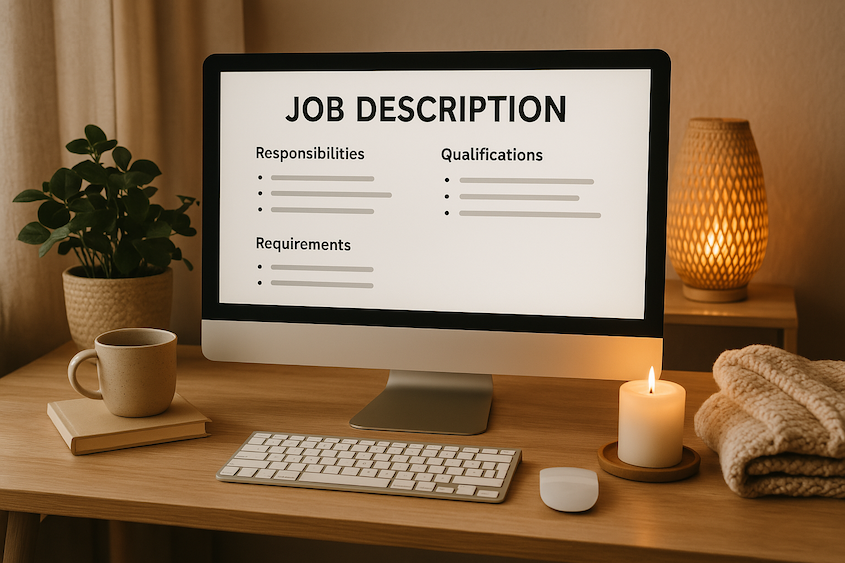Best Practices for Crafting the Best Interview Questions: Insights for HR Managers
The article emphasizes best practices for crafting effective interview questions, highlighting their critical role in assessing candidates'...
Engage
|
Hire
|
Develop
|
Assure
|
|
Deeply understand your organisation with science-backed analytics on your culture, team design, and engagement. |
Automatically match to candidates who are a great fit for your team culture and who are intrinsically motivated to succeed. |
Back your onboarding, compliance and skill development with industry-leading credentialling, competency and capability expertise.
|
Reimagine skills assessment and certification with dedicated tools designed to elevate your competency frameworks.
|
.png?width=383&height=200&name=team%20(1).png)
14 min read
 Compono
Apr 2, 2025 8:55:21 AM
Compono
Apr 2, 2025 8:55:21 AM

The article delineates best practices for HR managers in formulating effective interview questions that evaluate both candidate qualifications and cultural alignment within an organisation. By highlighting the significance of clear, open-ended inquiries and a systematic approach to interviewing, the article illustrates that well-constructed questions can markedly improve hiring outcomes and foster employee engagement. This alignment ultimately connects talent acquisition with the core values and objectives of the organisation.
In talent acquisition, crafting effective interview questions is crucial. As organisations aim to align candidates with their core values and culture, the recruitment process evolves into a strategic endeavour that transcends mere qualifications.
Utilising well-structured questions enables hiring managers to unveil deeper insights into a candidate's potential, fostering not only a better fit for the role but also enhancing overall employee engagement. Research indicates that cultural alignment significantly impacts retention and performance, making the focus on thoughtful, open-ended inquiries essential.
This article explores the multifaceted nature of interview questions, highlighting best practices, types of questions, and the pivotal role of feedback in refining recruitment strategies.
Interview inquiries are crucial tools in the recruitment process, serving as an important connection between an applicant's resume and their actual fit with the organisation. These questions allow hiring managers to assess not only the qualifications of applicants but also their cultural fit and potential for engagement within the team, underpinned by Compono's culture and engagement assessments and integrated HR solutions.
Research indicates that companies with a thriving corporate culture can achieve over four times higher revenue growth compared to those with weaker cultures. This highlights the significance of aligning applicants with organisational values through effective questioning, which can directly influence employee engagement and retention. Compono's technology platform supports this alignment by providing science-backed insights that enhance the recruitment process - such as understanding culture or job-fit gaps that require more investigation.
Well-designed inquiries can uncover essential insights into an applicant's problem-solving capabilities, interpersonal skills, and alignment with organisational values. For example, Gallup's extensive survey of over 2.7 million employees has pinpointed 12 essential inquiries that assess employee engagement. By incorporating these inquiries into the selection process, HR managers can significantly improve hiring results and ensure that candidates align with the company culture, thereby boosting performance and engagement.
In 2025, the importance of interview inquiries in recruitment is more pronounced than ever. With only 34% of employees engaged at work, the need for HR managers to prioritise the quality of their inquiries is paramount. By focusing on the right inquiries, organisations can address engagement issues and improve their recruitment processes, leading to better hiring decisions and reduced mismatches.
Compono's innovative HR technology solutions facilitate this by automating workforce management and enhancing employee engagement.
Moreover, effective interview questions can enhance hiring success rates by ensuring that applicants not only possess the necessary skills but also resonate with the company culture. As Joanna Plohl, Group HR Manager, notes, "This enables us to look beyond our industry to find quality candidates who have transferable skills and fit right in." This approach not only enhances the hiring process but also contributes to a positive organisational culture that drives overall performance.
Ultimately, by investing in the quality of great interview questions, HR managers can foster a more engaged workforce, reduce turnover, and create a supportive work environment that enhances productivity and employee satisfaction, aligning perfectly with Compono's mission of compassionate leadership in HR.

Interview prompts can be effectively categorised into three primary types: behavioural, situational, and technical. Each type serves a distinct purpose in assessing applicants and can significantly influence hiring outcomes, especially when supported by Compono's predictive insights.
Behavioural Questions: These questions focus on past experiences and actions, prompting individuals to recount specific instances where they demonstrated relevant skills or behaviours. For instance, asking, 'Tell me about a time you faced a challenge at work,' enables interviewers to evaluate how individuals have navigated difficulties in the past, offering insight into their problem-solving abilities and resilience. Compono's technology improves this process by giving insights into behaviours and work preferences BEFORE the shortlisting and interview stage - giving the insights needed to craft the right behavioural questions.
Situational Inquiries: In contrast, situational inquiries present hypothetical scenarios to gauge how individuals might respond in future situations. An example would be, 'What would you do if you were faced with a tight deadline?' This approach helps interviewers evaluate a candidate's critical thinking and decision-making skills under pressure, offering a glimpse into their potential future performance. Research indicates that structured discussions, which utilise standardised questions, significantly enhance the validity of employment evaluations. Meta-analyses have found mean corrected validities between 0.41 and 0.47 for situational assessments, underscoring their effectiveness in predicting job performance. Furthermore, a case study examining the impact of situational interviews on job simulation performance revealed that when accounting for applicant traits, the correlation between interview performance and job simulation performance decreased, suggesting that situational interviews can effectively identify candidates who will excel in real-world scenarios. Compono's insights can assist HR managers in developing these inquiries to align with the specific challenges of their roles.
Technical Questions: These questions assess specific skills or knowledge relevant to the job. For instance, asking, 'Can you explain the process of data analysis you would use for this project?' enables interviewers to determine whether applicants possess the necessary technical expertise to succeed in the role. By leveraging Compono's predictive insights, HR managers can ensure that technical inquiries are tailored to the skills that are most critical for success in their organisation.
By employing a strategic mix of these inquiry types, HR managers can gain a comprehensive understanding of a candidate's capabilities and cultural fit for the role. Best practices suggest that a great interview question should frame behavioural questions to elicit detailed responses, ensure situational questions are relevant to the specific challenges of the role, and align technical questions closely with the skills required for success. This multifaceted approach not only improves the assessment process but also aids in making informed, data-driven hiring decisions.
In a rapidly changing work environment, Compono meets the demand for improved personnel decisions by integrating science, strategy, and human insight, emphasising the significance of structured assessments in attaining successful hiring results. Furthermore, with Compono's services such as 'Hire' and 'Develop,' HR managers can streamline their hiring and learning management tasks, enabling them to concentrate on strategic initiatives while Compono handles the heavy lifting.
To craft effective inquiries, HR managers should adhere to several best practices, including formulating great interview questions to enhance the quality of the hiring process. First and foremost, inquiries must be clear and concise to eliminate any potential confusion. This clarity is crucial as it directly impacts the individual's ability to respond effectively, ultimately influencing hiring outcomes.
Employing open-ended inquiries is an effective strategy for interview questions. These types of inquiries motivate individuals to expand on their experiences and thought processes, offering greater insights into their appropriateness for the role. For instance, asking applicants to describe a challenging situation they faced and how they handled it can reveal their problem-solving abilities and interpersonal skills.
A great interview question involves aligning inquiries with the specific competencies required for the role. This ensures that each inquiry is pertinent to the job description and assists in evaluating whether applicants possess the necessary skills and qualities. Incorporating the STAR method (Situation, Task, Action, Result) can help formulate effective interview questions, prompting candidates to provide detailed responses that showcase their capabilities in real-world scenarios.
Additionally, piloting inquiries with colleagues can be beneficial. Collecting feedback from colleagues enables HR managers to refine questions prior to the actual discussions, ensuring they are effective and targeted. This practice not only enhances the quality of information collected during discussions but also promotes a collaborative approach to hiring.
The organised hiring procedure at Compono involves a phone screening with the People team, followed by an initial meeting with the Direct Hiring Manager and another relevant team member. Depending on the position, candidates may also undergo technical and psychometric evaluations prior to the second meeting. This second meeting involves a Tech/Team Lead and a Senior Team Member, with an offer pending police and reference checks.
Such a systematic approach highlights the significance of effective selection practices in aligning talent acquisition with broader business goals.
Statistics show that 77% of mid-sized companies consider HR a strategic function, underscoring the importance of effective hiring practices in aligning talent acquisition with broader business objectives. By implementing these best practices, HR managers can develop a framework for great interview questions that significantly improves their hiring outcomes, leading to more engaged and productive teams.
Case studies highlight the Compono difference in HR technology, where a proactive approach to culture and talent design has enabled companies to align their people strategy with business strategy. This comprehensive viewpoint encourages a more involved workforce, showcasing the effect of thoughtfully designed inquiries on overall organisational success.

Aligning interview inquiries with company culture and values is essential for recognising individuals who will not only fit in but also prosper within the organisation. To begin, HR managers should clearly define the core values and cultural attributes that are essential to the company. This foundational step enables the creation of targeted questions that evaluate individuals' alignment with these values.
For instance, asking applicants, 'How do you prioritise teamwork in your work?' can reveal their collaborative mindset and compatibility with the team dynamic. Moreover, inquiring about applicants' preferred work environments can yield valuable insights into their potential fit within the company culture. This alignment is not merely a matter of preference; it significantly impacts team cohesion and fosters a sense of belonging among new hires. Research indicates that organisations with a strong cultural fit experience higher employee retention rates, with studies showing that 90% of professionals have researched a company's culture before accepting a role. This statistic underscores the importance of cultural alignment in hiring decisions.
Furthermore, ongoing enhancements in questioning techniques, driven by feedback from both candidates and evaluators, can lead to substantial improvements in recruitment practices. For example, a case study analysing employee values in company culture revealed that respect, supportive leadership, and alignment with core values are paramount for employee satisfaction. When interview questions reflect these insights, organisations can better identify individuals who resonate with their cultural ethos.
Joanna Plohl, Group HR Manager at Clarendon Homes, emphasises this point, stating, "This enables us to look beyond our industry to find quality candidates who have transferable skills and fit right in."
As the landscape of work continues to evolve, it is imperative for HR managers to prioritise cultural fit in their recruitment methods. By crafting great interview questions that reflect company values and culture, they not only enhance the likelihood of successful hires but also contribute to a more engaged and cohesive workforce.
Compono, as a leading HR system, offers integrated solutions that assist HR managers in this process by providing data-driven insights that align hiring practices with organisational culture. This ensures that new hires are not only qualified but also a perfect fit for the team. Additionally, Compono's features, such as automated applicant assessments and analytics, enhance workforce management and drive performance through science-backed insights, ultimately fostering a more engaged and productive workplace.
Unrestricted inquiries serve as a significant interview question, functioning as essential instruments in interviews that encourage applicants to elaborate on their experiences rather than providing simple 'yes' or 'no' answers. For instance, instead of asking, 'Did you enjoy your last job?', an HR manager might ask, 'What aspects of your last job did you find most fulfilling and why?'. This approach encourages applicants to share their personal stories, motivations, and reflections, providing interviewers with essential insights into their character and fit for the position.
Research indicates that 77% of mid-sized companies recognise HR as a strategic function, underscoring the necessity for effective interviewing methods that align with organisational objectives. Unrestricted inquiries not only enhance the depth of responses but also foster a more conversational environment, which can significantly boost participant comfort and involvement throughout the selection process. By employing Compono's unified HR technology solutions, which include functionalities like automated scheduling, compliance monitoring, and performance analytics, HR managers can optimise workforce management and enhance employee engagement through structured discussions that incorporate these methods.
The effectiveness of open-ended inquiries, such as a great interview question, is further supported by case studies demonstrating that probing prompts yield deeper insights and a greater understanding of individuals' experiences and viewpoints. For example, the case study titled 'Probing Inquiries in User Interviews' highlights how open-ended prompts can elicit more profound responses, enhancing the overall quality of the interview. By fostering a dialogue rather than a one-sided interrogation, HR managers can uncover valuable information that might otherwise remain concealed, particularly when leveraging personality assessments for strategic job matching and talent profiling within Compono's HR technology platform.
Moreover, the strength of open-ended questions, such as a great interview question, lies in their capacity to enhance responses. They encourage applicants to reflect on their past roles and articulate their thoughts in a manner that reveals their alignment with the company’s culture and values.
This approach not only aids in assessing fit but also contributes to a more positive candidate experience, crucial in today’s competitive job market. The benefits of employing open-ended questions during discussions will continue to be evident, as they not only improve candidate engagement but also facilitate a deeper understanding of how candidates think and operate. By incorporating these strategies into the interview framework, alongside Compono's structured recruitment method—which includes a step-by-step guide from initial phone screens to final interviews—HR managers can make more informed hiring decisions that align with their organisational needs.
Additionally, the compliance and automation features of Compono's solutions ensure that the hiring process remains efficient and adheres to industry standards.

When assessing applicant responses, HR managers should concentrate on several critical aspects to ensure a thorough evaluation. First, it is essential to gauge the relevance of the answer to the interview question posed. Candidates should provide specific examples that clearly illustrate their skills and experiences, as this demonstrates their ability to apply knowledge in practical situations.
Second, the depth of the response is crucial; individuals who provide detailed answers typically possess a more profound understanding of their experiences. This depth can indicate their capacity for critical thinking and problem-solving, which are vital in many roles.
Third, assessing the individual's communication style and confidence level is important, as these factors can reveal their interpersonal skills and overall suitability for the position. Effective communicators are often better equipped to collaborate within teams and engage with clients.
Moreover, HR managers should be vigilant for any red flags in applicant responses. Vague answers or a lack of self-awareness may suggest potential issues with fit for the organisation. For instance, statistics indicate that employees stay 41% longer at companies with high internal mobility, highlighting the importance of aligning individuals with organisational culture and values.
This viewpoint coincides with Compono's organised recruitment approach, which emphasises a thorough assessment of applicants beyond conventional metrics, including psychometric evaluations and systematic discussions.
By applying these evaluation criteria, HR managers can improve their interviewing methods, leading to more informed hiring decisions. Real-world instances of effective evaluation methods, such as behavioural assessments, further support this approach, ensuring that the selection is both rigorous and fair. Ultimately, these strategies contribute to building high-performing teams that drive organisational success.
Additionally, considering Recruitment ROI can provide a financial perspective on the effectiveness of recruitment strategies, resonating with HR managers focused on metrics. The necessity of aligned and productive teams in the current work landscape, as highlighted in the case study 'Why It Matters Now,' underscores the importance of effective evaluation techniques for applicants.
Input plays a crucial role in the continuous improvement of inquiries and procedures within an organised hiring framework. Following each selection cycle, HR managers should actively seek input from both assessors and candidates regarding the effectiveness of the interview questions posed and the overall experience. This can be accomplished through structured surveys or informal discussions, enabling a comprehensive understanding of the dynamics.
The organised recruitment process at Compono generally includes several essential stages:
Examining this feedback allows HR managers to pinpoint specific areas for enhancement, such as identifying interview questions that fail to elicit meaningful responses or acknowledging methods that may inadvertently create discomfort for candidates. Research indicates that one in four job applicants report that job discussions significantly influence their decision to accept a job offer, underscoring the importance of a positive experience during these discussions.
By consistently refining their selection methods based on this feedback, HR managers can greatly enhance the quality of their hiring systems. This iterative approach aligns with organisational goals and fosters a more engaging and effective recruitment strategy. Organisations that have adopted feedback-driven enhancements in their interview methods have found that asking effective interview questions leads to greater applicant satisfaction and improved alignment of new employees with company culture.
Integrating Compono's predictive insights into this approach can further enhance the effectiveness of candidate matching, ensuring that HR professionals are equipped with the tools necessary to make informed hiring decisions. A recent study involving 382 managers highlighted the varying perceptions of feedback accuracy between providers and recipients, emphasising the need for clear communication and understanding in the feedback exchange. This aligns with attribution theory, which suggests that feedback providers and recipients have access to different information, influencing their perceptions of feedback accuracy and qualifications.
By utilising these insights, HR professionals can develop a more robust framework for refining questions, ultimately leading to improved hiring outcomes and a more cohesive organisational culture.
As the work environment continues to evolve, adjusting selection processes to address the shifting requirements of applicants and organisations is essential. The urgency of this adaptation is underscored by the necessity of making informed people decisions to ensure success in a competitive environment.
To implement effective interview strategies, HR managers should focus on several key practices:
Recognise the Role of Inquiry Questions: A well-crafted interview question is essential for identifying candidates who align with both the role and the company culture. Research indicates that organised discussions significantly enhance hiring outcomes, fostering a more engaged workforce. Moreover, the hiring decision-making process should be transparent, fair, and devoid of bias, aligning with best practices in effective interview strategies.
Employ a Diverse Inquiry Mix: Utilising a blend of behavioural, situational, and technical inquiries allows for a comprehensive evaluation of applicants. This approach reveals not only their skills but also their problem-solving abilities and cultural fit. Compono's predictive insights can assist in tailoring these inquiries to better align candidates with the positions they seek.
Craft Clear, Open-Ended Inquiries: Clear, open-ended questions encourage candidates to share their experiences and thought processes. Such inquiries promote deeper conversations, providing insights into how individuals think and operate in various situations—an essential aspect for enhancing organisational design and workforce development.
Evaluate Responses Thoroughly: Assess applicant responses based on relevance, depth, and communication style. This evaluation should focus on how effectively individuals articulate their thoughts and connect their experiences to job requirements. For instance, live technical assessments during discussions can heighten stress and cognitive load, potentially reducing performance by 50%. Therefore, balancing assessment methods is crucial for optimal outcomes, a principle supported by Compono's science-backed insights.
Solicit Feedback for Continuous Improvement: After each interview, gathering feedback from all participants is vital for refining the interview process. This iterative approach identifies effective strategies and areas for improvement, leading to more effective interviewing techniques over time. By leveraging Compono's comprehensive workforce management solutions, HR managers can continuously enhance their strategies.
By implementing these strategies, HR managers can improve their interviewing techniques, leading to better hiring decisions and a more engaged workforce. Incorporating these best practices not only aligns with the current demands of the rapidly changing work landscape but also supports the goal of creating aligned, productive teams, as emphasised by the company's commitment to informed people decisions.

Crafting effective interview questions is pivotal in the recruitment process, serving as a bridge between candidates' qualifications and their cultural fit within an organisation. Well-structured inquiries further reveal candidates' skills and their alignment with company values, ultimately influencing employee engagement and retention. By integrating various types of questions—behavioural, situational, and technical—HR managers gain a comprehensive understanding of a candidate's capabilities, ensuring better hiring outcomes.
The significance of open-ended questions cannot be overstated, as they encourage candidates to share their experiences in depth, fostering a conversational atmosphere that enhances engagement. Feedback is essential in refining interview processes; continuous improvement leads to more effective hiring strategies. Leveraging tools and insights from Compono's innovative HR technology allows organisations to streamline recruitment efforts, making informed decisions that align talent acquisition with broader business goals.
Prioritising the quality of interview questions and the overall recruitment strategy is essential for fostering an engaged and productive workforce. As the competitive landscape of talent acquisition evolves, HR managers must embrace these best practices, ensuring they find qualified candidates while cultivating a cohesive company culture that drives organisational success. Investing in thoughtful interviewing techniques is not merely a tactical approach; it is a strategic imperative that lays the foundation for long-term employee satisfaction and retention.
What is the role of interview inquiries in the recruitment process?
Interview inquiries are essential tools that connect an applicant's resume to their actual fit within an organisation. They allow hiring managers to assess qualifications, cultural fit, and potential engagement within the team, which is crucial for leveraging integrated HR solutions.
How does corporate culture impact a company's revenue growth?
Research indicates that companies with a thriving corporate culture can achieve over four times higher revenue growth compared to those with weaker cultures, highlighting the importance of aligning applicants with organisational values through scientifically validated assessments and effective questioning.
What insights can well-designed interview inquiries uncover?
Well-designed inquiries can reveal essential insights into an applicant's problem-solving capabilities, interpersonal skills, and alignment with organisational values, significantly improving hiring results.
Why is the quality of interview inquiries important in 2025?
With only 34% of employees engaged at work, prioritising the quality of interview inquiries is crucial for HR managers to address engagement issues and improve recruitment processes, leading to better hiring decisions and reduced mismatches.
What types of interview questions are there?
Interview questions can be categorised into three primary types: behavioural, situational, and technical, each serving a distinct purpose in assessing applicants.
What are behavioural questions and how are they used?
Behavioural questions focus on past experiences, prompting candidates to recount specific instances demonstrating relevant skills or behaviours. This helps interviewers evaluate problem-solving abilities and resilience.
How do situational inquiries differ from behavioural questions?
Situational inquiries present hypothetical scenarios to gauge how candidates might respond in future situations, helping interviewers assess critical thinking and decision-making skills under pressure.
What is the purpose of technical questions in interviews?
Technical questions assess specific skills or knowledge relevant to the job, enabling interviewers to determine whether candidates possess the necessary expertise to succeed in the role.
How can Compono's technology enhance the interview process?
Compono's technology provides insights that help HR managers develop effective inquiries tailored to the organisation's needs, improving the alignment of candidates with specific challenges and skills required for success.
What is the benefit of using a strategic mix of inquiry types in interviews?
Employing a mix of behavioural, situational, and technical inquiries allows HR managers to gain a comprehensive understanding of a candidate's capabilities and cultural fit, leading to informed, data-driven hiring decisions.

The article emphasizes best practices for crafting effective interview questions, highlighting their critical role in assessing candidates'...

Effective interview questions are essential for evaluating candidates' qualifications, thought processes, and cultural fit. By focusing on...

Overview The article outlines best practices for interview questionnaires and answers, highlighting the significance of structured approaches to...

The article provides an overview of effective hiring practices by presenting sample interview questions and responses that enhance the recruitment...

Job descriptions serve as formal documents that delineate the essential functions, responsibilities, and qualifications for specific positions. They...

The article provides a comparative analysis of recruitment software solutions, focusing on their features and effectiveness in streamlining the...